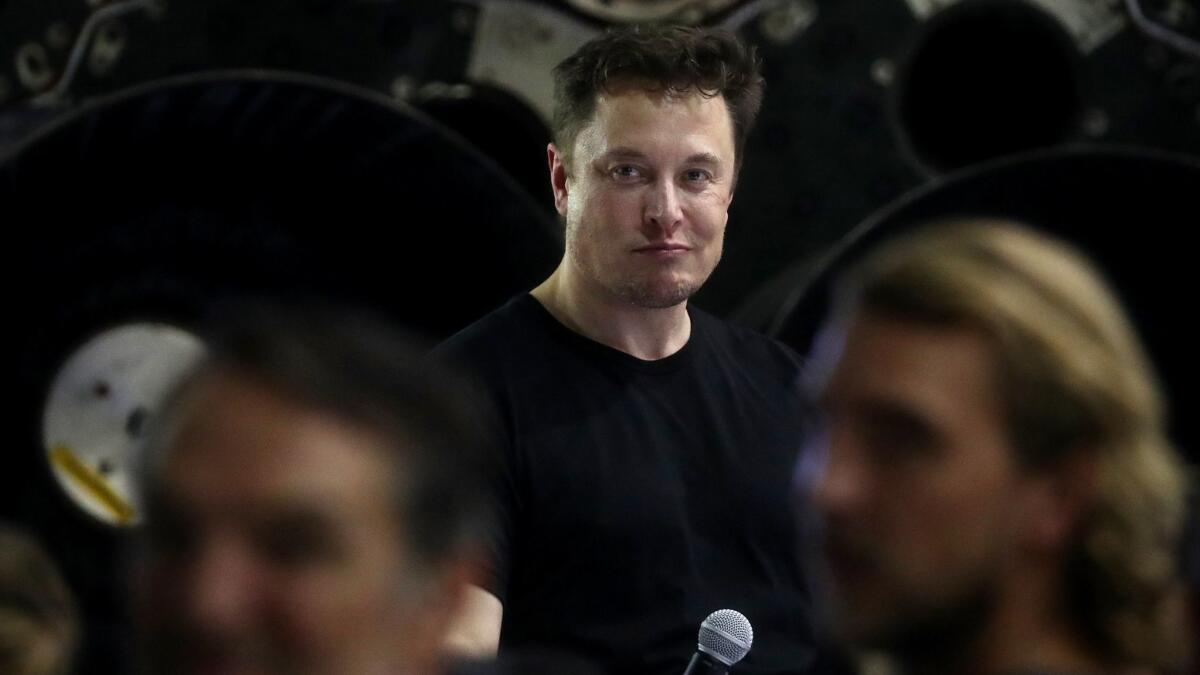Criminal investigation could hurt Tesla fundraising and recruitment

Elon Musk is often called a visionary, an innovator, a genius. A U.S. Department of Justice investigation will determine whether he also committed a crime.
The Justice Department is investigating whether public statements made by Musk and Tesla — the electric car company he runs as chief executive — were misleading enough to constitute criminal fraud, the company confirmed Tuesday. Bloomberg had earlier reported the investigation.
The inquiry began after Musk’s infamous Aug. 7 tweet, in which he claimed he had “funding secured” for a plan to take Tesla private. Tesla stock shot up on the news, then fell as no source of the funding was revealed. Musk pulled the plug on the plan three weeks later.
A criminal investigation usually takes months to complete, and litigation, if it comes to that, could take years. Tesla shares initially plunged on the news, but recovered enough to finish down 3.4% at $284.96 — not that unusual of a daily swing for the volatile stock, which is down 11% year to date.
Because the Securities and Exchange Commission is also investigating Tesla, the market may have already absorbed any potential fallout, said securities lawyer and former SEC investigator Jay Dubow at law firm Pepper Hamilton. “When the SEC is looking at a company or an individual, I assume it’s likely the DOJ is looking too,” he said. “Many investigations the SEC is involved in these days have a criminal component to them.”
The news, however, could affect the company’s ability to attract new capital and to lure new talent. Tesla has been burning cash and bleeding top executive talent.
“On the debt side, they would definitely be raising money at far higher costs than they did last year. That was true even before the DOJ probe,” said David Whiston, stock analyst at Morningstar. In August 2017, Tesla sold $1.8 billion in bonds rated high risk and carrying an interest rate of $5.3%. Investors have bid those bonds down to an 8% yield, Whiston noted.
Meanwhile, more than 18 senior executives have departed Tesla this year, including Dave Morton, who started as chief accounting officer the day before Musk’s go-private tweet and left within a month. Investigators will probably look into the circumstances of the former Seagate chief financial officer’s quick departure.
Some Tesla investors have been pushing the company’s board of directors to bring in a new chief executive or a chief operating officer to help Musk, who is dealing with a range of personal issues, including a defamation suit filed against him Monday by a participant in the rescue of Thai children from a flooded cave earlier this year. Musk had accused the man, via Twitter, of pedophilia and child rape. Musk is also dealing with the fallout from a recent YouTube webcast in which he accepted a marijuana cigarette from the show’s host and smoked it.
“From a talent perspective, it would take a special executive to take on a company with this much headline risk and Elon Musk as your boss,” Whiston said. A fresh executive “would want autonomy,” he said. “What would be the point of walking away from something lucrative if Musk is going to be breathing down your neck?”
The extent of the SEC and Justice Department investigations is unclear. In its official statement Tuesday, Tesla said: “Last month, following Elon’s announcement that he was considering taking the company private, Tesla received a voluntary request for documents from the DOJ and has been cooperative in responding to it. We have not received a subpoena, a request for testimony, or any other formal process. We respect the DOJ’s desire to get information about this and believe that the matter should be quickly resolved as they review the information they have received.”
Asked whether Tesla has received a subpoena from the SEC, whether Musk personally received a subpoena from the Justice Department, and whether the company’s statement covers both Tesla and Musk or just Tesla alone, a Tesla spokesman said the statement released Tuesday “is the extent of what we’re sharing.”
The SEC and Justice Department could find no wrongdoing and drop their cases. If the inquiry results in an indictment, prosecutors might try to reach a plea deal, while defendants could take any case to trial, Dubow said. A guilty finding could result in a prison sentence, he said. Securities fraud carries a maximum sentence of 25 years, and wire fraud (which includes internet communications) 20 years.
“This goes back decades,” Dubow said. “Ivan Boesky, Mike Milken, they both faced SEC and criminal cases. They both went to jail.”
Earlier this year, Theranos founder Elizabeth Holmes settled with the SEC for defrauding investors in the blood-testing company. In June, the Justice Department charged her with criminal fraud.
Twitter: @russ1mitchell
UPDATES:
Sept. 19 7:30 a.m.: This story was updated with comment from a Tesla spokesman.
More to Read
Inside the business of entertainment
The Wide Shot brings you news, analysis and insights on everything from streaming wars to production — and what it all means for the future.
You may occasionally receive promotional content from the Los Angeles Times.











